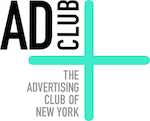Cindy Gallop Defines Bravery
On October 1st, the industry gathered at Advertising Week XI for”ANDY 50 Defining Bravery“, a session hosted by The AD Club in honor of the 50th anniversary of The International ANDY Awards. Throughout this year, the ANDYs have united the industry to celebrate the past five decades advertising and usher in the future with a platform centered on bravery. Because bravery is something that resonates with our industry, and the future of the ad business relies on those who are brave enough to challenge the status quo and push the envelope for the sake of creating a stronger future industry.
The event host and outgoing 2014 ANDYs Chairman, David Droga, invited three industry icons — Cindy Gallop, Gerry Graf and Colleen DeCourcy — to inspire audience members with stories of bravery in advertising and creativity. After, three audience members were randomly selected to come up on stage and share their own stories of bravery.
Here’s what Cindy Gallop, founder of IfWeRanTheWorld and MakeLoveNotPorn, had to say:
“In our industry, we talk a lot about bravery and doing brave work; and we blame the fact that there isn’t more brave work because there aren’t more brave clients. But bravery begins at home. If we aren’t brave ourselves, we can’t expect anyone else to be.”
Gallop went on to tell the audience how to make our industry more brave, by defining the three levels of bravery that our industry needs: industry leadership, mid-level and junior level talent.
On the top-most level occupied by people who run our industry (or think they do):
“Bravery is sitting at the top, having already made millions and having a vested interest in not rocking the boat, but being prepared to change that in order to make this a better industry for everyone else in it. Bravery is saying ‘I see a sea of white male faces and I don’t feel comfortable working with only white males, and then actively sitting out, making people feel uncomfortable, hiring people who bring discomfort because they are different. Bravery is deciding your legacy will be not how much money you made or how big you made your company, but that you saved the industry to create a better, more lucrative industry for the next generation of agencies and brand marketers to come. Bravery is not kidding yourself that you’re doing that currently. Bravery is saying that aloud. It’s not brave when I say it, because I don’t care what the leaders of holding companies think because I don’t work for them. It is brave when YOU say it and do it.”
On the next level down:
“Bravery at that level is realizing you aren’t doing the work you really want to do and leaving the company; not leaving to go work for another company, but starting an agency based on your own values that will be truly innovative, treat its employees well and do good. It is putting together a founding team that is at least 50/50 men: women and diverse, and having them clash in constructive conflict to take you to an amazing place that otherwise wouldn’t be reached.”
“Bravery is focusing on the results, not the process, so that no one needs to be in the office day in and day out just to show they are putting the hours in. It is articulating and identifying the agency you want to build, projecting it in a standout polarizing way, and putting it out there regardless of what other people think so you attract the clients you want and repel the ones you don’t. It is redesigning the way you make money. Refusing to give pitch thinking and creativity away for free. Refusing to pitch in impossible timelines that mean large numbers of people will have to work through holidays and family time. I don’t see it happening at this level currently.”
On the junior level:
“Bravery is being the most junior person in the room and saying what you think. Living by your principles and being content with losing out on money as a result because you know that doing that will make you more money in the long run. Bravery is trusting someone and everyone to do what you ask them to do. It is calling out environments that are all white male and asking to change that; asking your client to make sure they credit your agency by name whenever they show your work. Bravery is pointing out your own value and asking to be paid what you’re worth, and leaving when you’re not. Sharing ideas with people around you so everyone benefits and not just you.”
“We can change the culture of our industry and the future of our industry. 90% of our industry is afflicted with ‘bystander syndrome.’ When you see that other people are fine with what’s going on and see that people aren’t bothered or want to change anything; you are never going to be brave. Bravery requires you to be a deviant — deviate from the norm. A brave industry has a limitless future full of limitless opportunities, but that depends on each and every one of us being brave in every moment, every day, so we change for the better and save advertising together.”

